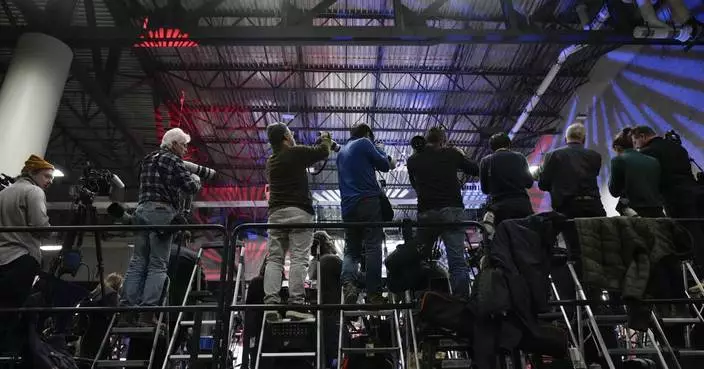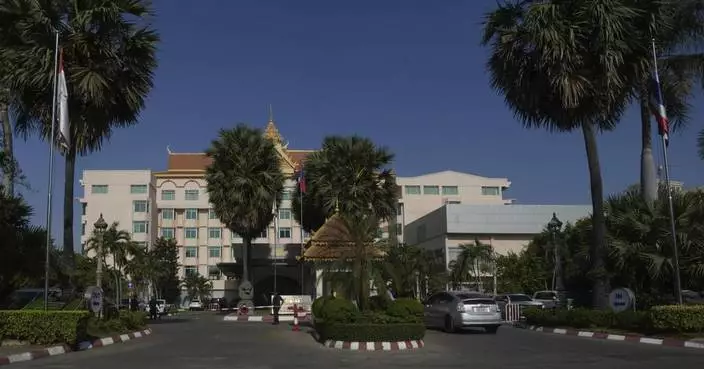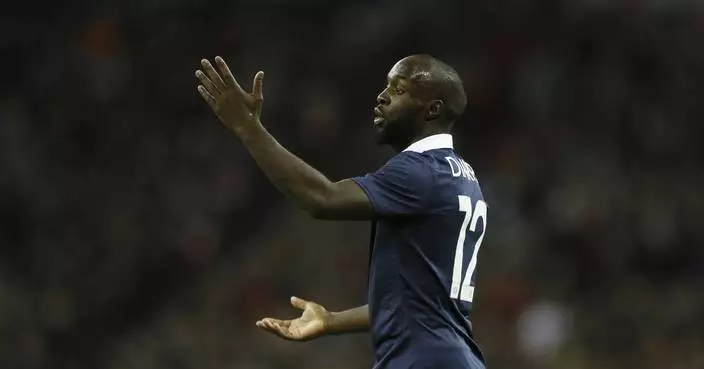The wife of the former Interpol president who is being detained in China on bribery charges says she's been contacted by Chinese diplomats, who have told her they're holding a letter from him for her.
Grace Meng says, however, that she'll only agree to meet Chinese officials if a lawyer and reporters are present. She says Chinese officials haven't responded since she told them that condition.
She says she also asked that the letter from her husband, Meng Hongwei, be given to French police, so they can give it to her. She has been living under French police protection in the French city of Lyon, where Interpol is headquartered, since she reported that her husband went missing while on a trip to China in late September.
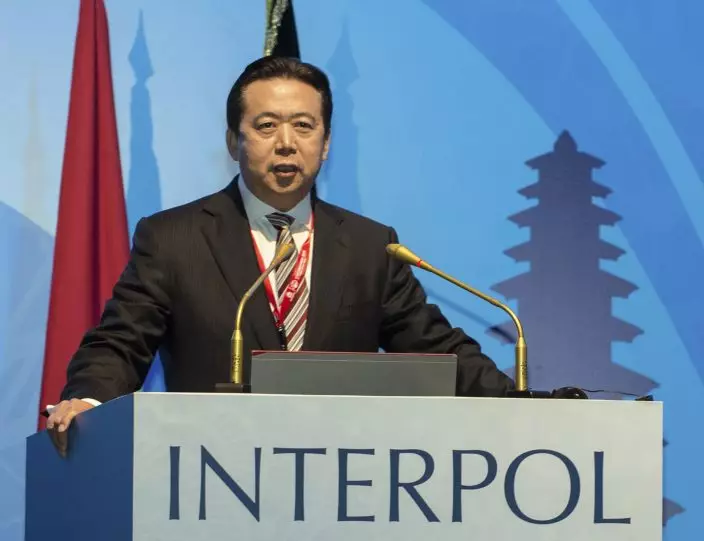
FILE - In this Nov. 10, 2016 file photo, released by Xinhua News Agency, then China's Vice Minister of Public Security Meng Hongwei delivers a campaign speech at the 85th session of the general assembly of the International Criminal Police Organization (Interpol), in Bali, Indonesia. China detained the now former Interpol chief, who was taken into custody upon arriving in Beijing late Sept. 2018, the latest in a number of Chinese figures who went missing only to appear in court accused of corruption. The disappearance of Saudi Journalist Jamal Khashoggi, during a visit to his country’s consulate in Istanbul on Oct. 2, 2018, raises a dark question for anyone who dares criticize governments or speak out against those in power: Will the world have their back? (Du YuXinhua via AP, File)
"They said my husband wrote a letter to me," she said in an interview Friday with The Associated Press in Lyon. "They said they can only give it to me alone."
Grace Meng said the disappearance and suspected slaying of journalist Jamal Khashoggi at Saudi Arabia's consulate in Istanbul, Turkey, wasn't a factor in her refusal to meet unaccompanied with Chinese officials. However, she made clear that she finds them impossible to trust, calling them "cruel."
China says Meng Hongwei, 64, is under investigation for graft and possibly other crimes.
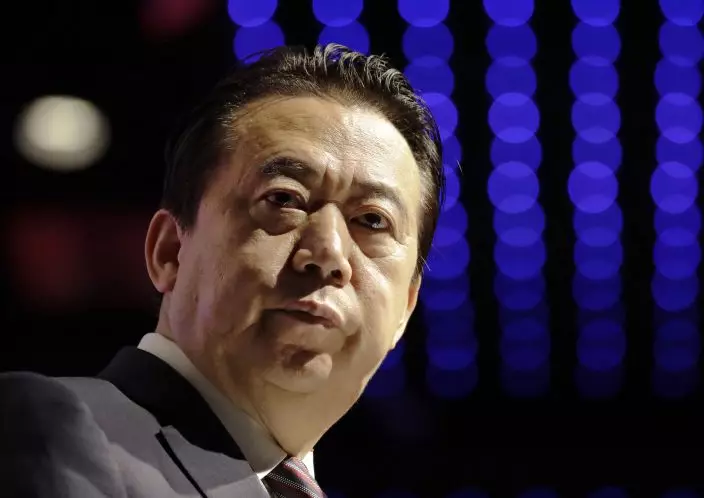
FILE - In this July 4, 2017, file photo, Interpol President Meng Hongwei delivers his opening address at the Interpol World congress, in Singapore. Chinese authorities say they are investigating the former president of Interpol for bribery and other crimes and indicate that political transgressions may have also landed him in trouble. In a statement posted on a government website Monday, Oct. 8, 2018, the authorities said Meng Hongwei, China's vice minister for public security, was being investigated due to his own "willfulness and for bringing trouble upon himself." (AP PhotoWong Maye-E, File)
Meng was China's vice minister of public security while also leading Interpol, and a longtime Communist Party insider with decades of experience in China's sprawling security apparatus. He appears to be the latest high-ranking official to fall victim to a sweeping purge under authoritarian Chinese President Xi Jinping.
During the AP interview, one of the very few occasions when she has agreed to be filmed, Grace Meng wept as she recounted a dream she had about her husband the previous night.
"I'm sad, I feel hopeless but angry, too, even hate," she said. "You can imagine when your children, when your sons ask: 'Where's Daddy?' How can I answer? Who wants their children to grow up (when) they have no daddy?"
Grace Meng has refused in repeated interviews and phone calls with the AP to provide her real name, saying she is concerned for the safety of relatives in China. It is not customary for Chinese wives to adopt their husbands' names. Grace Meng says she has done so now to show her solidarity with her husband. Her English name, Grace, is one she has long used, she says.
Grace Meng says she cannot believe the bribery accusation against her husband and claims he's the target of "political persecution."
"The term anti-corruption in China has become a synonym for crimes that are unjustifiable," she said.
China's move to secretly detain the Interpol president, an official with international standing, was an unusually audacious action even for an administration that under Xi's leadership has sought to assert its interests aggressively on the global stage.
Grace Meng says she is speaking out about her husband's case, at risk to herself, not just to defend him but also to highlight the fate of others who have disappeared into China's opaque police system.
"Everybody in China is at risk," she said. "Everyone should be concerned that something like this could happen to them."
Gillian Wong in Beijing contributed to this report.
BEIRUT (AP) — The European Union announced Thursday an aid package for Lebanon of 1 billion euros — about $1.06 billion — much of which will go to boost border control to halt the flow of asylum seekers and migrants from the small, crisis-wracked country across the Mediterranean Sea to Cyprus and Italy.
The deal follows other EU aid packages for countries such as Egypt, Tunisia and Mauritania to fortify their borders. It comes against a backdrop of increasing hostility toward Syrian refugees in Lebanon and a major surge in irregular migration of Syrian refugees from Lebanon to Cyprus.
European Union Commission President Ursula von der Leyen said during a Beirut visit with Cypriot President Nikos Christodoulides that the aid distribution will start this year and last till 2027.
The bulk of the aid — 736 million euros — would go to support Syrian refugees “and other vulnerable groups” in Lebanon, while 200 million euros are meant to bolster Lebanese security services in enforcing border and migration control, according to figures provided by the Cypriot government.
An unspecified amount would go to Lebanese fishermen, to discourage them from selling their boats to smugglers.
Von der Leyen said the EU will also work on a “more structured approach to voluntary return" of Syrian refugees "in close cooperation with” the U.N. refugee agency. The bloc will continue to maintain “legal pathways” for resettlement of refugees in Europe, she said.
Lebanon's caretaker Prime Minister Najib Mikati praised the package, saying that “Lebanon’s security is security for European countries and vice versa,” and that an escalation of the crisis ”will not be limited to Lebanon but will extend to Europe."
Lebanon, which has been in the throes of a severe financial crisis since 2019, hosts nearly 780,000 registered Syrian refugees and hundreds of thousands more who are unregistered, the world's highest refugee population per capita.
Lebanese political officials have for years urged the international community to resettle the refugees in other countries or assist their return to Syria — voluntarily or not. Lebanese security forces have stepped up deportations of Syrians over the past year.
Tensions further flared after an official with the Christian nationalist Lebanese Forces party, Pascal Suleiman, was killed last month in what military officials said was a botched carjacking by a Syrian gang. The incident prompted outbreaks of anti-Syrian violence by vigilante groups.
Meanwhile, Cypriot authorities complain the island nation has been overwhelmed by irregular migration of Syrian asylum seekers, many of them coming on boats from Lebanon.
The UNHCR in Lebanon said it had verified 59 “actual or attempted” departures by boats carrying a total of 3,191 passengers from Lebanon between January and mid-April, compared to three documented boat movements carrying 54 passengers in the same period last year. Usually, few boats attempt the much more dangerous crossing in the winter. In all of 2023, UNHCR recorded 65 boat departures carrying 3,927 passengers.
Cyprus has taken a new approach to halting the flow of migrants. Last month, it suspended processing of Syrian asylum applications, and human rights groups accused the Cypriot coast guard of forcibly turning back five boats carrying about 500 asylum seekers coming from Lebanon. Cypriot officials have denied this.
Bassel al-Shayoukh, a Syrian refugee from Idlib living in Lebanon since 2014, said his brother and several cousins and nephews were on one of the boats turned back. Now he wants to make the journey himself.
“In the beginning I thought that in a year or two the war would be over in Syria,” he said, but it dragged on, while in Lebanon “every year ... the situation began to get worse.”
Shayoukh said he fears being beaten by vigilantes or deported to Syria after Lebanese authorities declined to renew his residency permit.
His 17-year-old nephew, who declined to give his name fearing for his safety, said the Cypriot coast guard started making waves to push the boat he was on away. “I was terrified... I don’t know how to swim,” he said. “I thought we were going to die.”
The people on the boats “stayed three days without food or water” before turning back to Lebanon, the teen added.
Back in Lebanon, they were detained by the army; those registered with UNHCR were released and the others deported.
Mohammed Sablouh, a Lebanese human rights lawyer who works on refugee and migrant cases, says Lebanese authorities are deliberately “turning a blind eye" to the surge in migration to "pressure the international community.”
The Lebanese army did not respond to a request for comment on their measures to combat smuggling.
Thursday's aid announcement comes ahead of the annual fundraising conference for the Syrian crisis in Brussels later this month. After 13 years of civil war, donor fatigue has set in while the world’s attention is occupied by the humanitarian fallout of more recent conflicts in Ukraine and Gaza.
The Cypriot president said Thursday was a “historic day” and called for European officials to go farther and declare some areas of Syria safe for return.
“The current situation is not sustainable for Lebanon. It is not sustainable for Cyprus, it is not sustainable for the European Union,” Christodoulides said.
But not all Lebanese officials are convinced the European aid would solve the problem.
Lebanese Forces party head Samir Geagea told The Associated Press earlier this week that European authorities are mainly concerned “that the refugees don’t go to Europe."
"For us the problem is that we cannot have our country drowning in illegal Syrian refugees,” Geagea said, urging for Syrians to be sent back to either government or opposition-held areas of the neighboring country.
But Shayoukh says he has nowhere to go.
The Damascus government wants him for opposing Syrian President Bashar Assad, he said, while the Islamist group that now controls his hometown behaves "the same way as the regime’s intelligence services” in crushing dissidents.
Associated Press writer Menelaos Hadjicostis in Nicosia, Cyprus, contributed to this report.
Follow AP’s global migration coverage at: https://apnews.com/hub/migration

Lebanese caretaker Prime Minister Najib Mikati, center, speaks during his meeting with Cyprus' President Nikos Christodoulides, left, and President of the European Commission Ursula von der Leyen at the government palace in Beirut, Lebanon, Thursday, May 2, 2024. (AP Photo/Hassan Ammar)
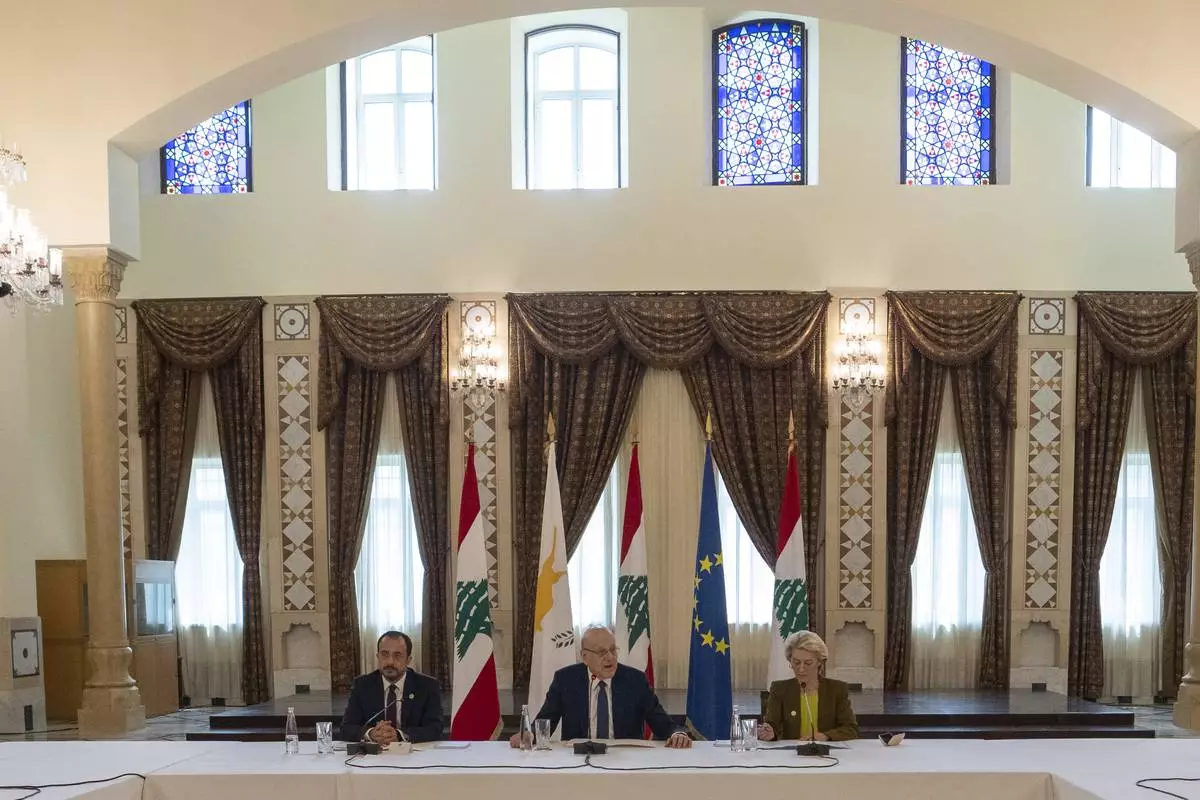
Lebanese caretaker Prime Minister Najib Mikati, center, speaks during his meeting with Cyprus' President Nikos Christodoulides, left, and President of the European Commission Ursula von der Leyen at the government palace in Beirut, Lebanon, Thursday, May 2, 2024. (AP Photo/Hassan Ammar)
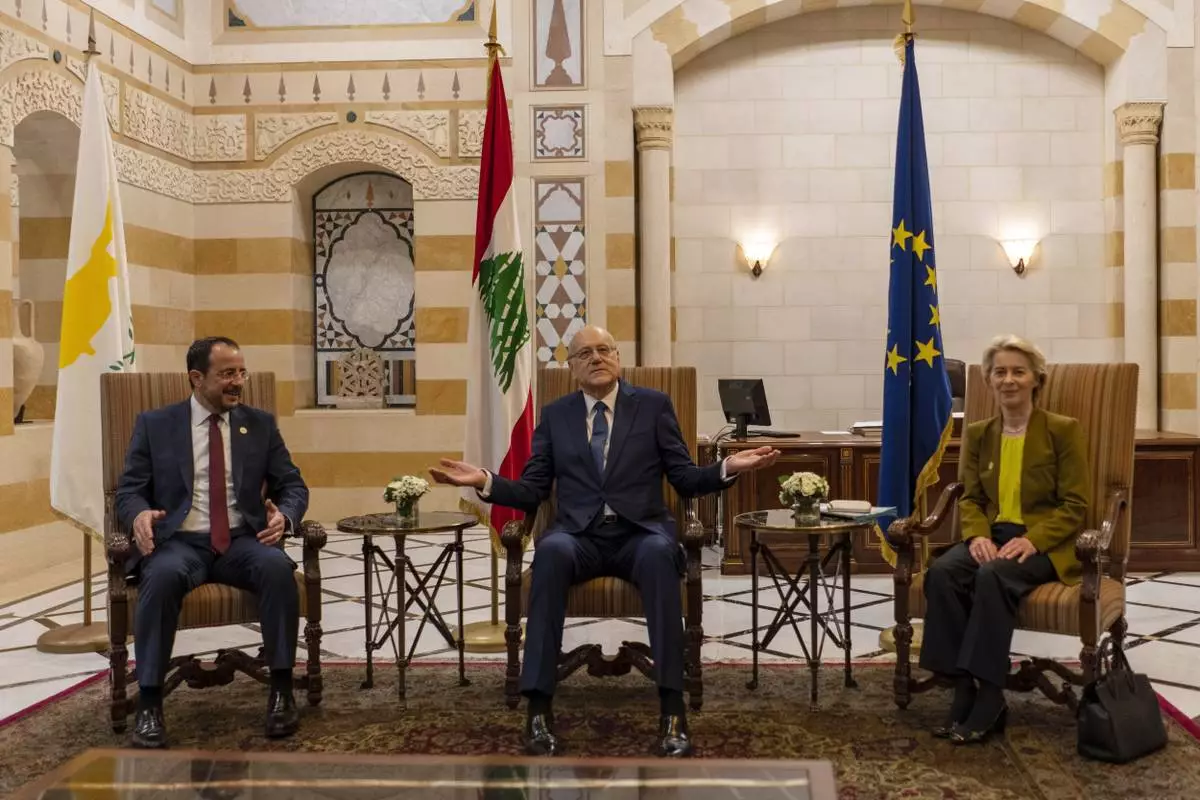
Lebanese caretaker Prime Minister Najib Mikati, center, welcomes Cyprus' president Nikos Christodoulides, left, and President of the European Commission Ursula von der Leyen before their meeting at the government palace in Beirut, Lebanon, Thursday, May 2, 2024. (AP Photo/Hassan Ammar)
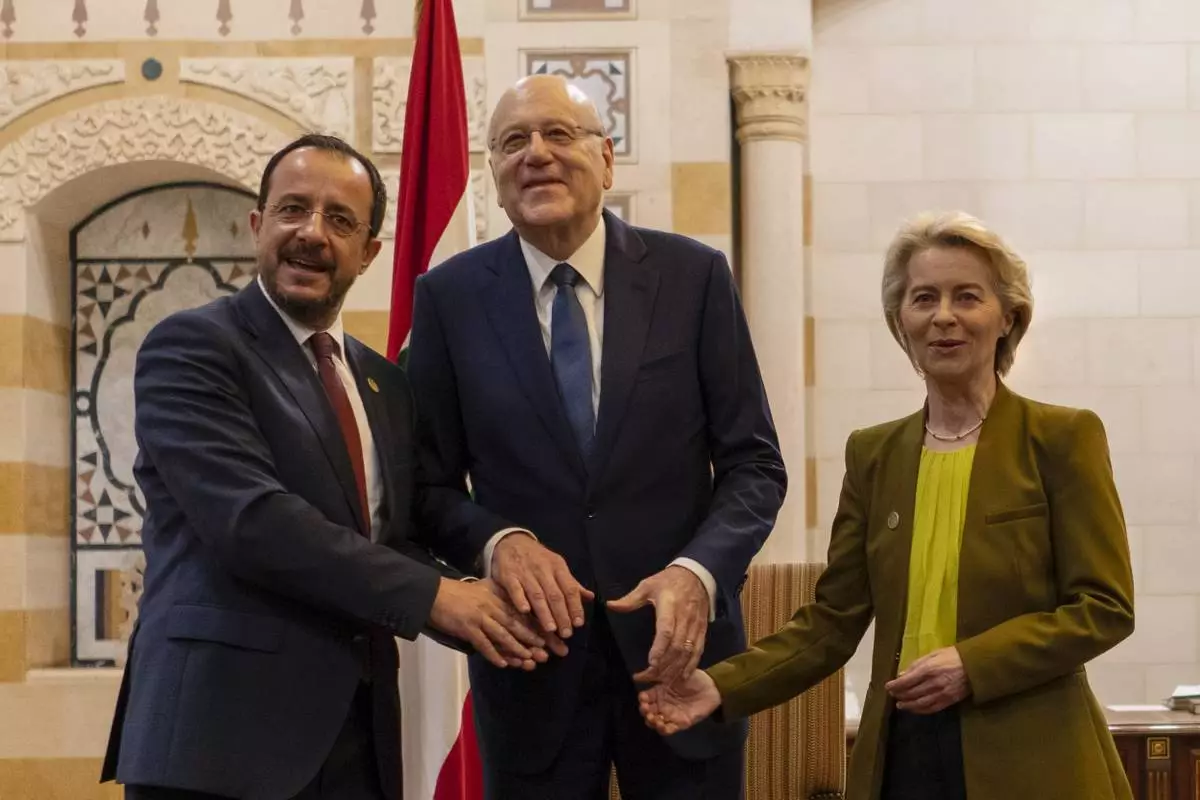
Lebanese caretaker Prime Minister Najib Mikati, center, Cyprus' President Nikos Christodoulides, left, and President of the European Commission Ursula von der Leyen pose for photograph at the government palace in Beirut, Lebanon, Thursday, May 2, 2024. (AP Photo/Hassan Ammar)
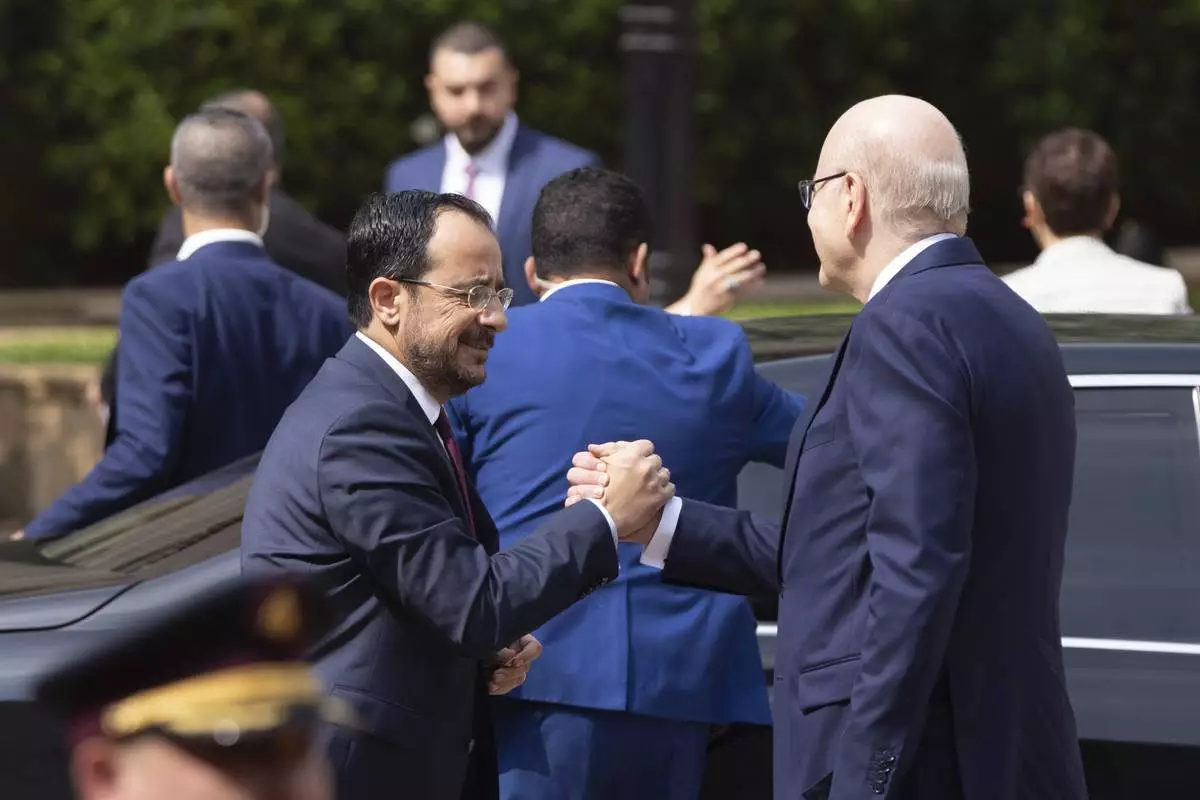
Lebanese caretaker Prime Minister Najib Mikati, right, welcomes Cyprus' president Nikos Christodoulides before their meeting at the government palace in Beirut, Lebanon, Thursday, May 2, 2024. (AP Photo/Hassan Ammar)

Cyprus' President Nikos Christodoulides, left, and President of the European Commission Ursula von der Leyen, center, review an honor guard upon their arrival to meet with the Lebanese Speaker Nabih Berri, in Beirut, Thursday, May 2, 2024. (AP Photo/Hussein Malla)

Lebanese caretaker Prime Minister Najib Mikati, center, speaks during his meeting with Cyprus' President Nikos Christodoulides, left, and President of the European Commission Ursula von der Leyen at the government palace in Beirut, Lebanon, Thursday, May 2, 2024. (AP Photo/Hassan Ammar)
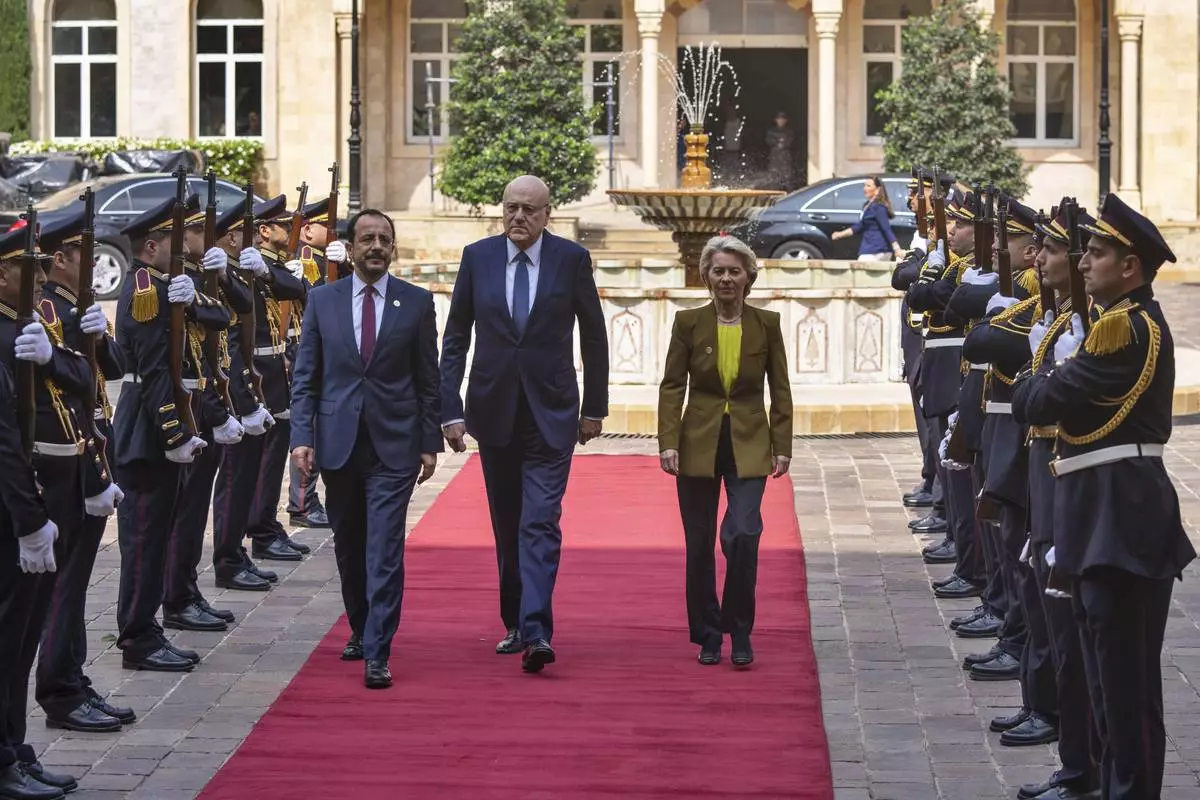
Lebanese caretaker Prime Minister Najib Mikati, center, welcomes Cyprus' President Nikos Christodoulides, left, and President of the European Commission Ursula von der Leyen at the government palace in Beirut, Lebanon, Thursday, May 2, 2024. (AP Photo/Hassan Ammar)













